Spring 2026 Course Offerings
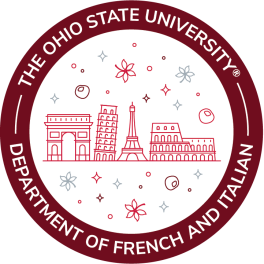
The most up-to-date list of course offerings is always available via View Schedule of Classes on BuckeyeLink.
Note on New GE Program
The University will roll out a new General Education program for new students beginning in Autumn 2022. These GE requirements will be called "General Education - New" or GEN.
Requirements for students under the previous General Education program will not change. They will continue to complete the same GE program — now called the "General Education – Legacy" or GEL.
FRIT Graduate Associates must work with faculty advisors and the Academic Program Coordinator if enrolling in 8303 (teaching apprenticeship), 8998 (pre-candidacy), 8999 (dissertation research), and/or 8899 (dissertation workshop) hours.
Please refer to the Schedule of Classes via BuckeyeLink to view days and times of these offerings.
French Introductory Language - GEL Foreign Language; GEN: World Languages
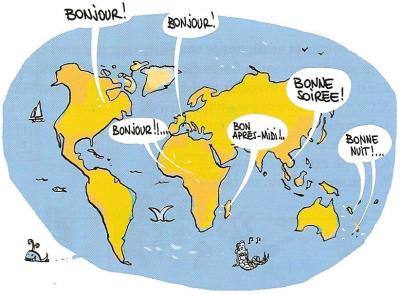
French 1101.01, 1102.01, 1103.01 - Beginning French I, II, and III Classroom (4 credit hours)
French 1101.21, 1102.21, 1103.21 - Beginning French I, II, and III Distance Learning (4 credit hours) 1101.21 also offered as an asynchronous learning option (4 credit hours)
French 1155.01 - Beginning French Review Classroom (4 credit hours)
French 1155.21 - Beginning French Review Distance Learning (4 credit hours)
Interested students can learn more about the modalities in which French basic-language sections are taught using this guide to French language (requires log-in).
Italian Introductory Language - GEL Foreign Language; GEN: World Languages
Italian 1101.03, 1102.03, 1103.03 - Beginning Italian I, II, and III Blended (4 credit hours)
Italian 1101.71, 1102.71, 1103.71 - Beginning Italian II and III Online (4 credit hours)
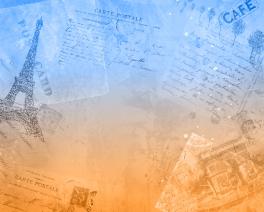
French 1198 - French on the Ground
Dr. Denis Mingallon, 7W2 asynchronous
French on the Ground is an asynchronous course designed to build practical French for travel, study abroad, and internships in francophone settings. Through short, theme-based lessons, students develop confidence in everyday communication and reflect on cultural and intercultural contexts.
French 2101.01 – Introduction to French & Francophone Studies
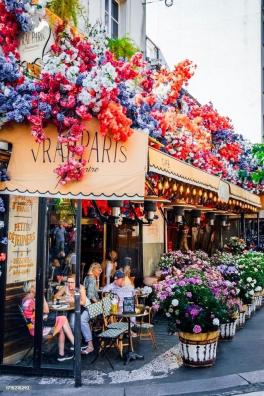
19044: Professor Adela Lechintan-Siefer, TR 11:10am-12:30pm, Hagerty Hall 159, 3 credit hours, taught in French.
37572: Professor Kate Schlosser, TR 11:10am-12:30pm, McPherson 1021, 3 credit hours, taught in French.
Welcome to the threshold to the French minor and major! In French 2101, you will have the opportunity to practice and improve your reading, writing, listening, and speaking skills in French, as well as to continue learning about French & Francophone literatures and cultures through reading, viewing, and interpreting authentic literary and visual texts from around the Francophone world.
This lively course serves as a bridge between language courses (1101-1103) and upper-level courses in French. By emphasizing all four skills (listening, speaking, reading, and writing), it will improve your proficiency and prepare you for further coursework in language, literature, culture, and film and for a minor or major in French or French and Francophone Studies. In it you will interpret and analyse both in oral discussion and in writing a variety of texts (short stories, films, songs, posters, etc.) from France and the Francophone world. Some grammar points will be reviewed, although grammar will be covered more intensely in FR 3101, which may be taken either at the same time as or after FR2101.
French 2101.61 - Introduction to French & Francophone Studies I.I.
Online Individualized Instruction (I.I.), 1-3 credit hours, taught in French
Techniques for reading and interpreting different types of texts from the French-speaking world: stories, poetry, plays, films, music, and ads while building vocabulary, comprehension, speaking and writing skills.
Prereq: 1103.01, 1103.21, or 4 cr hrs of 1103.51 or 1103.61, or permission of instructor. Not open to students with credit for 2101.01, 2101.01H, or 2101.51. Repeatable to a maximum of 3 cr hrs or 3 completions. This course is available for EM credit.
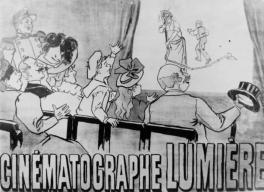
French 2801 - French Cinema - GEL Visual and Performing Arts, GEN Foundation: Literary, Visual & Performing Arts
Holly Engel, WF 11:10am-12:30pm, Derby Hall 080, 3 credit hours, taught in English
Explore French cinema from its pioneering beginnings to the present day. Get to know the major eras in the history of French Cinema, such as the silent era, Poetic Realism, the Tradition of Quality, the New Wave, and modern French cinema, all within the context of French culture. Learn to discuss film as a text and talk about technical aspects like framing, mise-en-scène, and shot composition. The course is taught in English and all films are subtitled. No background in French or film studies is necessary.
French 2803.01 - Paris - GEL: Cultures & Ideas; GEN Theme: Lived Environments
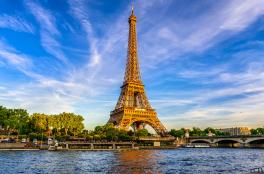
Professor Ryan Joyce, TR 4:10pm-5:05pm, ONLINE, 3 credit hours, taught in English
What was the city of Paris like in 1789, and how have its geography and society evolved over the last two centuries? By reading and viewing representations of Paris in a variety of media (maps, paintings, photographs, films, and literary and historical texts), we will explore both how the city’s landscape has shaped its society and how its increasingly diverse society has in turn shaped and transformed its landscape to suit Parisians’ evolving needs, desires, and caprices. Each two-week unit will treat representations of a specific event or era in Parisian history that had a significant impact on the city’s organization, architecture, and/or demography, and together the units will give us a general understanding of Parisian history over the last 230 years and of the multiple ways in which that history has been represented, and thus manipulated for various purposes.
French 3101 - French Grammar Review
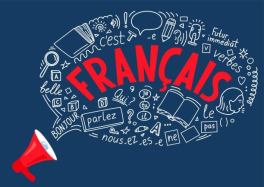
Dr. Kelly Campbell, TR 12:45pm-2:05pm, Mendenhall 174, 3 credit hours, taught in French
“Bootcamp French” in the words of a former student, this course improves your ability to speak and write. We will review grammar “rules”, focus on how context creates meaning, and strengthen vocabulary by studying false cognates . Through online discussions, personal narratives and opinion pieces, students will practice speaking and writing more nuanced, accurate French.
Prereq: 1103.01, 1103.21, 4 cr hrs of 1103.51 or 1103.61, or permission of instructor. Prereq or concur: 2101.01, 2101.01H, or 3 cr hrs of 2101.51 or 2101.61. This course is available for EM credit.
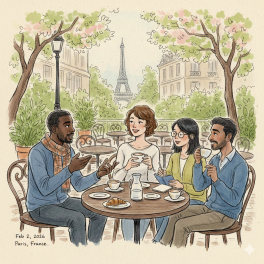
French 3102 - Pronunciation & Performance
Professor Kate Schlosser, WF 3:55pm-5:15pm, Hagerty 159, 3 credit hours, taught in French
Parlez-vous français ? In this class you will! French 3102 aims to guide all students toward more accurate pronunciation of the French language in its many iterations throughout the francophone world. We will learn a new alphabet, review rules of pronunciation and diction, then put this knowledge to use through the performance of songs, poetry and plays. We will use film, television and YouTube to explore who speaks French and how they do it. After this class, you will never look at or listen to French the same again!
This course is not open to those students who are native speakers or who have already developed near-native conversational abilities in French.
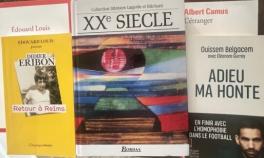
French 3201 - French Literary and Visual Texts: Society in Flux - GEN: Literary, Visual, & Performing Arts
Professor Mauro Cazzolla, TR 2:20pm-3:40pm, Hagerty Hall 042, 3 credit hours, taught in French
In this course we will explore the ways in which contemporary literature and films have been shaping and are being shaped by the social, political, moral, and aesthetic preoccupations of the French people through the 20th and 21st century. We will read some prose, poetry and plays, and watch some movies by iconic authors and directors. Writers such as Albert Camus, Annie Ernaux, Édouard Louis and Ouissem Belgacem will be discussed in light of the contemporary historical and cultural contexts in which they have been produced and consumed. Burning questions related to social violence, racism, gender and sexuality will be debated in this lively discussion class.
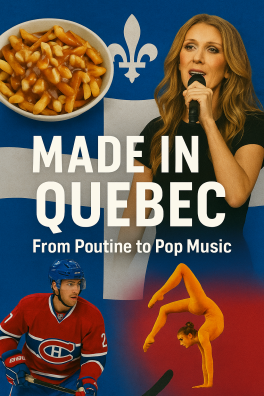
French 3802 - Made in Quebec: From Poutine to Pop Music & Everything in Between - GEN Theme: Traditions, Cultures, and Transformations
Professor Wynne Wong, ONLINE, 3 credit hours, taught in English
What do poutine, Céline Dion, hockey, and Cirque du Soleil have in common? They’re all part of Quebec’s vibrant popular culture, which both reflects and reshapes the province’s identity.
This course explores how Quebec’s cultural expressions such as food, music, sports, cinema, and more have served as powerful tools of expression and change in Quebec. We’ll trace how Indigenous traditions, French and British colonial legacies, and global immigration have shaped Quebec’s cultural landscape. Along the way, we’ll examine how the Quiet Revolution transformed society, shifting power between dominant and marginalized groups, and how these dynamics continue to influence Quebec today.
By engaging with Quebec’s cultural products—from classic chansons to contemporary cinema—you’ll gain insight into how language policy, social movements, and everyday practices intersect to create a rich, evolving cultural identity.
This course is taught in English, and delivered completely online in an asynchronous format. The course may be taken from anywhere at any time as long as assignments are completed by established due dates. Regular optional synchronous meetings are also available via Carmen Zoom.
This course satisfies the goals and meets the expected GE learning outcomes for the theme of Traditions, Cultures, and Transformations
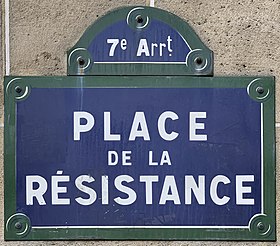
French 3803 - Cultures of Resistance - GEN Theme: Citizenship for a Diverse & Just World
Professor Adela Lechintan-Siefer, WF 11:10am-12:30pm, Scott Lab E004, 3 credit hours, taught in English
The Resistance required secrecy, imagination, and courage to face the Nazi occupation during World War II. It is part of a long history of struggle for freedom and equality with pivotal moments such as the French revolution, Haitian Revolution, and decolonization.
In this course, we will explore and analyze how the concept of citizenship through resistance has been represented in the literature, film, music, and comics of the French-speaking world. We will examine works of art created to engage with cultural activism at crucial historic moments. We will study how individuals have been exercising the right to effect change in society by assuming agency in the face of various forms of oppression and power imbalance and apply these lessons to our own ideas for creating a more just and diverse world.
Variable topics in French and Francophone literatures and cultures
French 4100 - Advanced French Grammar for Contemporary Contexts
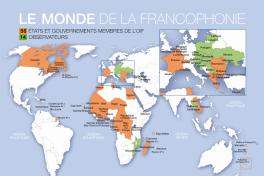
Dr. Anne Mutidjo, WF 2:20pm-3:40pm, Hagerty Hall 251, 3 credit hours, taught in French
Why study advanced French grammar if you are interested in international affairs? Human rights? Food? Finance? Migrants? Medicine? To follow these issues in the francophone media, you need to master the written language by becoming a more educated, informed reader, as well as a more skilled, articulate writer of French.
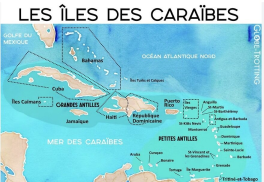
French 4401 – Écologie et culture populaire visuelle - GEN: Advanced Writing Embedded Literacy
Professor Margaret Flinn, TR 9:35am-10:55am, Hagerty Hall 186, 3 credit hours, taught in French
French 5201 - Gothic to Renaissance Texts and Contexts: Smart Ladies, Strategic Troubadours, and Persuasive Scholars of Medieval France
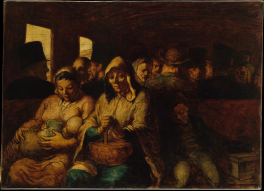
Undergraduate / Graduate sections available
Professor Sarah-Grace Heller, TR 12:45pm-2:05pm, Hagerty Hall 206, 3 credit hours, taught in French
A survey of medieval French literature from its first appearances to the Renaissance. Using the “best-selling” Romance of the Rose as a guide (it’s an allegory where a nice guy falls in love with a rose and gets quite an education out of it), we will explore troubadour songs of love and war; the magic of King Arthur’s court; lives, lais and nouvelles by and about women authors, and more. The Middle Ages were an exciting time of growth and prosperity in France. We will read through the contexts of Gothic cathedrals, the birth of the Paris university, knights and ladies (the ladies were usually the smarter ones!), and the history of the French language.
Taught in French. Knowledge of Old French not required. Accommodations made for students from other departments.
Prerequisites: 3101 and either 3201 or 3202 or permission of instructor

Italian 1198.71 - Italian on the Ground
Instructor TBD; 7W1 Distance Learning, Asynchronous, Self-Paced Learning; 1 credit hour
A guided notebook to Italian language and culture intended for students studying abroad in Italy. This course will prepare students for a study abroad experience in Italy through an introduction to language, culture, and intercultural reflections.
Students looking to take this course must be studying abroad in the summer semester immediately following.
Italian 2053 - Italian Cinema - GEL: Visual & Performing Arts, GEN Foundation: Literary, Visual, & Performing Arts, GEL VPA: Global Studies
Professor Giuliano Migliori, TR 2:20pm-5:00pm, Cunz Hall 150, 3 credit hours, taught in English

Through examining the crossovers between ‘private’ arenas of home and family and ‘public’ realms of politics, the economy, and religion, this course aims to disclose how, in Italian culture, the personal spheres, the political battlefields, and the natural are inextricably linked. This course presents students with an overview of Italian cinema of the last eighty years and we will look in detail at films and serial television by several important Italian directors. We will touch upon major movements in Italian screen history, including Neorealism, ecological and industrial cinema, the spaghetti western filone, political cinema, postcolonial migrant films, and quality television shows unfolding new ways to look at Italian-ness. Topics and historical periods to be addressed include: Italian fascism (including Italy’s problematic alliance with Nazi Germany and the Partisan Resistance,) the role of cities and industries in the so-called ‘economic miracle’, gender and race relations, the Years of Lead and domestic terrorism, migration crisis, and new Italian Epic. How has the cinematic medium (re)produced different cultural margins of Italy?
Italian 2055 - Mafia Movies - GEL: Visual & Performing Arts; GEN Foundation: Literary, Visual, & Performing Arts

Karen Graves, WF 2:20pm-3:40 pm, ONLINE, 3 credit hours, taught in English
*This class is fully online. Distance synchronous with asynchronous components
The Mafia in Italy is referred to as an octopus as the organization pervades almost every facet of Italian cultural life. Tony Soprano, Don Vito and Michael Corleone, Lucky Luciano, Robert De Niro, Martin Scorsese, or Christopher Moltisanti are some of the figures that contribute to the myth of the Italian and Italian-American Mafias. Others, such as Jonas Carpignano, Peppino Impastato, and Roberto Saviano explore a new cinematic wave about organized crime. In this course we watch Italian and American mafia movie and television hits, and explore the myth of the Mafia that is so widespread in American popular culture, and trace its histories and receptions as it passes across time and through a variety of cinematic styles. We will question whether there exists a unique American or Italian cinema and television treating Mafias, in its polymorphic nature, and explore how filmmakers from the two countries approach the subject in dissimilar fashions, especially in terms of stereotyping, gender, politics, and representations of violence and alluring criminals.
This course can count as a course taught in English toward the Italian minor and the Italian or Italian Studies majors.
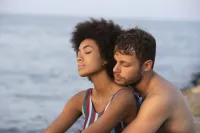
Italian 2056 - Love & Difference on the Italian Screen - GEL Diversity: Global Studies, GE Foundation: Literary, Visual & Performing Arts, GE Foundation: Race, Ethnicity & Gender Diversity
Professor Jonathan Mullins, TR 2:20pm-3:40pm, Fontana Laboratory 2040, 3 credit hours, taught in English
Love has long been a theme that has dominated Italian film and television. But how have such representations of love been conditioned by questions of identity including race, gender, sexuality and ethnicity? This course explores this question through representations of eros, romance and friendship in a variety of moving images. We will engage with silent film that looks at what it means to be a Southern Italian woman (Assunta Spina) to more recent film on cross-cultural friendship between migrants in Shun Li and the Poet, ands interracial romance in Summertime. We study how the theme of love condenses a variety of concerns and anxieties about racial, gender, sexual and ethnic identity, with attention to how these forms of identity emerge in the context of 20th and 21st century Italy. Students will reflect on what it means to study such forms of identity in the Italian context, and also on their own experiences and biases that they bring to the study of race, ethnicity, gender and sexuality as students in Ohio.
Never study cinema before? No worries. A crucial component of the course will be dedicated to studying the aesthetics of narrative cinema, and also understanding it as a complex industrial product with its own systems of production and reception.
Italian 2102 - Contemporary Italian Society
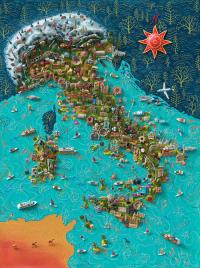
April Weintritt and Eric Johnson, TR 9:35am-10:55am, Hagerty Hall 251, 3 credit hours, taught in Italian
How did we arrive at the contemporary forms of Italian culture that one can find in Rome today? As the adage goes, "All roads lead to Rome," and indeed diverse trajectories have brought immigrants from within Italy and from abroad to call the capital city home. Deep and lasting transformations of Italian culture and society are more and more apparent; the influence of Italy’s institutions is waning, as a result of shifting and broadening traditions, values, and perspectives of what was once dominant and normative Italian cultural beliefs on religion, gender, family, and more. All these transformations are at play in the principal text of this course: the best-selling 2006 novel Clash of Civilizations for an Elevator in Piazza Vittorio by Amara Lakhous, an acclaimed Algerian-Italian author. Particularly when reading the principal novel but also in additional readings and videos, we will delve into the convergence of 20th and 21st century Italian cultural history and language expression through analysis of a variety of contemporary speech registrars, dialects, European cultural reference points, and immigration and refugee crises at the turn of the century.
In this course we explore modern and contemporary Italian society as we focus on the four language skills: listening, reading, writing, and speaking. Since you are transitioning from the elementary to the intermediate level, more emphasis will be placed on developing your reading skills, so you will be exposed to a lot of authentic Italian texts of different lengths and in different genres. However, your listening, writing, and speaking skills will not be ignored! Grammar will be reviewed and tested throughout the course.
The targeted structures are a review of nouns and adjectives; regular and irregular present indicative verbs; the passato prossimo, the imperfect, the past perfect (trapassato prossimo) and the remote past (passato remoto); the subjunctive mood, hypothetical constructions, and relative and interrogative pronouns.
Italian 3051 - Italian Romances - GEN Theme: Traditions, Cultures, & Transformations

Professor Jonathan Combs-Schilling, TR 11:10am-12:30pm, Caldwell Laboratory 220, 3 credit hours, taught in English
Knights of the Round Table, Amazon warriors, wild-west gunslingers, intergalactic Jedi—these heroic archetypes are linked by the narrative strategy of "romance." In this course, students will learn about the nature, origins and afterlives of a key chapter in its history—medieval and renaissance Italian romance—and investigate the enduring influence of romance narrative on how stories are told and communities are represented today.
We will begin with its classical and medieval roots (Homer’s Odyssey; Chretien de Troyes’ Yvain) and a few contemporary works that, like Monty Python’s Holy Grail, satirize the genre to become familiar with its conventions. We will then read medieval and renaissance “classics” of the genre, before turning to recent stories shaped by romance, from historical spy novels to Star Wars movies.
And *you* get to choose one of the books you'll be reading. Taught in English
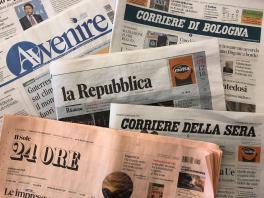
Italian 3222 - Modern Italian Media
Professor Qian Liu, WF 11:10am-12:30pm, Hagerty Hall 251, 3 credit hours, taught in Italian
This course examines 20th- and 21st-century Italian culture through a wide array of media, including novels, drama films, propagandistic newsreels, newspapers, radio, TV reports, comics, contemporary experimental documentaries, and international streaming platforms such as HBO and Netflix. At its core, the course asks: how do different media forms shape our understanding of modern Italian society? how do historical, political, and social changes in Italy influence the kinds of stories these media choose to tell? And ultimately, how should we redefine “media” in the 21st century? Topics include Benito Mussolini’s fascist and colonial ambitions, holocaust, terrorism in the 1960s and 1970s, Made in Italy, contemporary immigrations and refugee crisis, and Elena Ferrante’s global fever. This course is taught in Italian. Grammatical structures covered, in class or as independent review, include: piacere and similar verbs; direct and indirect object pronouns; ci and ne; formal/informal imperative (with object pronouns); common idiomatic expressions; and the possessive.
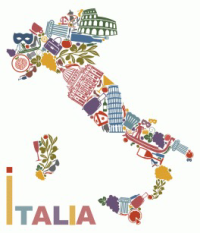
Italian 5101 - Intensive Italian
Undergraduate / Graduate sections available
Rosa Di Grottole, MWF 12:45pm-2:05pm, University Hall 047, 5 credit hours, taught in Italian
Intensive Italian covers the same material as Italian 1101, 1102, and 1103 in one semester! The course is fast-paced and ideal for students who are looking for a small, supportive, and inclusive classroom community and who find learning foreign languages interesting! Previous foreign language study ideal, but not required. Not open to native speakers of Italian.
Italian 5330 - Topics on La meglio gioventù
Undergraduate / Graduate sections available
Professor Jonathan Mullins, TR 3:55pm-5:15pm, Hagerty Hall 206, 3 credit hours, taught in Italian
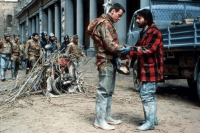
This course is structured as a cultural ecology that emerges from the world captured in Marco Tullio Giordana’s 2003 film La meglio gioventù (The Best of Youth). Originally broadcast as a RAI miniseries, this six-hour long family drama, which covers the major events from 1966 to the early 2000s, examines many of the major challenges of contemporary Italian life: natural disasters, political activism and violence, revolution, psychiatric care reform, educational reform, and new forms of subjectivity and personhood that emerge in the postwar era. We will deepen our understanding of these trends and events by engaging with the works of many of the figures that the film either features or indirectly mentions, be it the psychiatrist Franco Basaglia, the manifestos of radical leftist groups, la scuola di Barbiana, or writing by Italo Calvino, to name just a few. We will advance our ability to understand and communicate using formal Italian, improving our expression of complex idea ideas through a sustained engagement with the world that the drama portrays.
FRIT 3054 - The 21st-Century Skill: Intercultural Competence for Global Citizenship - GEL Diversity: Global Studies; GEN Theme: Citizenship for a Diverse & Just World
Taught in English, 3 credit hours
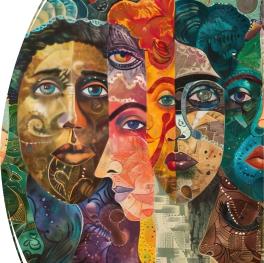
27836: Professor Rosa Di Grottole, WF 11:10am-12:30pm, Caldwell Laboratories 120
28834: Professor Giuliano Migliori, TR 12:45pm-2:05pm, Caldwell Laboratories 120
29427: Professor Janice Marie Aski, TR 2:20pm-3:40pm, Caldwell Laboratory 120
Intercultural competence is an essential characteristic for becoming globally-minded and functioning in multiple, diverse, local and non-local networks, and for that reason it has been identified as being among the top ten skills necessary for succeeding in the 21st century. Achieving the skills, knowledge, behaviors and attitudes of interculturally competent global citizens is a lifetime endeavor, so in this course you will acquire the foundations for the journey. This course is divided into four modules: 1) Foundational concepts; 2) Intercultural interactions; 3) Intercultural (communicative) competence; 4) Intercultural competence and citizenship. We will begin by exploring the complexities of the term ‘culture’ and how culture shapes our understanding of ourselves and others, our identity, and our worldview. You will explore your own cultural background by doing a cultural autobiography. You will delve into how implicit biases and stereotypes impact your interactions with others and learn to engage in inclusive practices that make you a better team player by participating in an investigative intercultural team project. In addition, you will learn the unique ways in which learning a world language and experiencing other cultures contribute to the development of intercultural competence.
This course meets the goals and expected learning outcomes of the GE theme category: Citizenship for a just and diverse world. It also counts as a course taught in English for the Italian/Italian studies majors and minor, and the French/French and Francophone studies majors and minor. This course also counts toward the ASC Leadership major.

Italian 5101 - Intensive Italian
Undergraduate / Graduate sections available
Rosa Di Grottole, MWF 12:45pm-2:05pm, University Hall 047, 5 credit hours, taught in Italian
Intensive Italian covers the same material as Italian 1101, 1102, and 1103 in one semester! The course is fast-paced and ideal for students who are looking for a small, supportive, and inclusive classroom community and who find learning foreign languages interesting! Previous foreign language study ideal, but not required. Not open to native speakers of Italian.
French 5201 - Gothic to Renaissance Texts and Contexts: Smart Ladies, Strategic Troubadours, and Persuasive Scholars of Medieval France

Undergraduate / Graduate sections available
Professor Sarah-Grace Heller, TR 12:45pm-2:05pm, Hagerty Hall 206, 3 credit hours, taught in French
A survey of medieval French literature from its first appearances to the Renaissance. Using the “best-selling” Romance of the Rose as a guide (it’s an allegory where a nice guy falls in love with a rose and gets quite an education out of it), we will explore troubadour songs of love and war; the magic of King Arthur’s court; lives, lais and nouvelles by and about women authors, and more. The Middle Ages were an exciting time of growth and prosperity in France. We will read through the contexts of Gothic cathedrals, the birth of the Paris university, knights and ladies (the ladies were usually the smarter ones!), and the history of the French language.
Taught in French. Knowledge of Old French not required. Accommodations made for students from other departments.
Prerequisites: 3101 and either 3201 or 3202 or permission of instructor
Italian 5330 - Topics on La meglio gioventù
Undergraduate / Graduate sections available
Professor Jonathan Mullins, TR 3:55pm-5:15pm, Hagerty Hall 206, 3 credit hours, taught in Italian

This course is structured as a cultural ecology that emerges from the world captured in Marco Tullio Giordana’s 2003 film La meglio gioventù (The Best of Youth). Originally broadcast as a RAI miniseries, this six-hour long family drama, which covers the major events from 1966 to the early 2000s, examines many of the major challenges of contemporary Italian life: natural disasters, political activism and violence, revolution, psychiatric care reform, educational reform, and new forms of subjectivity and personhood that emerge in the postwar era. We will deepen our understanding of these trends and events by engaging with the works of many of the figures that the film either features or indirectly mentions, be it the psychiatrist Franco Basaglia, the manifestos of radical leftist groups, la scuola di Barbiana, or writing by Italo Calvino, to name just a few. We will advance our ability to understand and communicate using formal Italian, improving our expression of complex idea ideas through a sustained engagement with the world that the drama portrays.
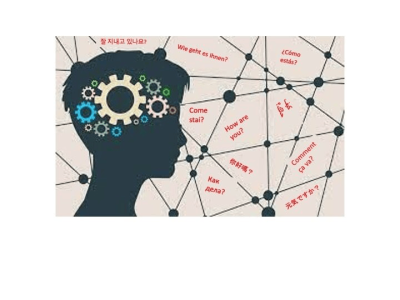
FRIT 8302 - Topics in Second Language Acquisition: INPUT PROCESSING, STRUCTURED INPUT, & GRAMMAR INSTRUCTION: THEORY, RESEARCH & CLASSROOM APPLICATION
Professor Wynne Wong, Online Asynchronous, 3 credit hours, taught in English
Link to video about the course: https://www.youtube.com/watch?v=vXzu2FJFtP8
When we learn a second language, not everything we hear or read gets processed—and only what is processed can actually be acquired. Therefore, the study of input processing is integral to SLA research and for the development of effective pedagogical activities for classroom learning. Studying how learners process input helps us understand what they notice, what they overlook, and how this shapes their learning. VanPatten’s model of input processing asks key questions: What parts of the input do learners attend to? Why do they process some features of input but not others? And how does what they process (and not process) affect language development?
This course examines theoretical and instructional implications of input processing research for the acquisition of grammar. Students will learn to critically evaluate research, understand its pedagogical implications, and design effective classroom interventions. You will practice creating structured input activities and other input-based grammar tasks to support language acquisition.
Topics include:
• the nature of input processing (what gets processed and why);
• current research trends;
• the role of explicit explanation;
• how processing instruction differs from other interventions;
• creating structured input activities;
• designing input-based grammar tasks.
A variety of activities are incorporated to foster engagement and interaction, and flexible final project options allow students to tailor the course to their professional goals.
This course is taught in English and delivered fully online in an asynchronous format. Students may participate from anywhere and at any time, as long as assignments are submitted by the established deadlines. The course is open to anyone interested in second language studies or language teaching and counts toward the Graduate Interdisciplinary Specialization (GIS) in Second Language Studies. Secondary education teachers are also welcome. FR 8301 is not a prerequisite.
FRIT 8601 - Decolonization: Theory and Practice
Professor Ryan Joyce, W 2:20pm-5:00pm, Thompson Library 149, 3 credit hours, taught in English
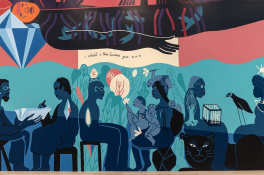
This seminar examines decolonization as a dynamic and evolving process, concurrently a historical event, a mode of critical analysis, and a cultural and social movement of repair. We will emphasize the theory and practice of decolonization, approaching it as an intellectual constellation of inquiry and as a lived, situated struggle across political, social, and cultural domains.
We will trace how imperialism and colonialism—emanating from France, Italy, Portugal, Spain, and the U.S.—have transformed social worlds, territories, and Indigenous languages and cultures, and how decolonization continues to unsettle these legacies through both critical and creative imagination and collective action across struggles over globalization, neo-colonialism, and environmental, cultural, and social liberation.
Our approach will be transdisciplinary, drawing from history, linguistics, anthropology, philosophy, diaspora and migration studies, gender and sexuality studies, and literary and cultural studies. Readings will include critical theory and scholarship from Hannah Arendt, Jean Casimir, Benjamin Stora, Aimé Césaire, Frantz Fanon, Aníbal Quijano, Michel Rolph-Trouillot, Linda Tuhwani Smith, Gloria Anzaldúa, Saidiya Hartman, Ngũgĩ wa Thiong’o, María Lugones, Françoise Vergès, Malcom Ferdinand, and Suzanne Césaire. We will also engage with cultural and creative production—including film, fiction, and graphic novel—by Gillo Pontecorvo, Ahmadou Kourouma, Sarah Maldoror, Raoul Peck, Ubah Cristina Ali Farah, and Jessica Oublié. Together, we will sharpen our tools of critical analysis and research while exploring how the lessons of decolonization and decolonial thought might inform the ways we produce and share knowledge and articulate our modes of praxis.
All class discussions and course materials will be in English, though students are encouraged, whenever possible, to read texts in the original languages they are studying.
FRIT Graduate Associates should work with their faculty advisors and the Academic Program Coordinator if enrolling in 8303 (teaching apprenticeship), 8998 (pre-candidacy), 8999 (dissertation research), or 8899 (dissertation workshop) hours.
